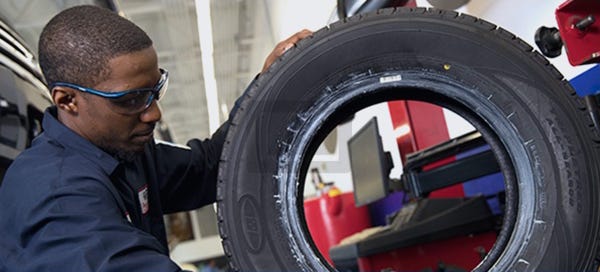Tire Service: The Impact of Weather Conditions
When it concerns ensuring optimum performance and safety when driving, recognizing the impact of climate problems on tire service is important. From scorching heat to icy roadways, each weather aspect can dramatically affect tire functionality and general driving experience. By diving right into the impacts of differing weather conditions on tires, motorists can obtain useful understandings that may improve their car's performance and durability. In this conversation, we will certainly check out the complex relationship between climate condition and tire solution, clarifying the value of weather-specific tire maintenance methods and factors to consider.
Warmth and Tire Performance
When subjected to high temperatures, tires experience adjustments in performance that can considerably influence lorry safety and security and handling. The warmth generated from extended driving or heat problems causes the tire rubber to soften, leading to decreased step life and enhanced wear. As the rubber ends up being softer, the tire's grasp when traveling lessens, affecting braking ranges and overall traction. In extreme instances, excessive warm can also create tire blowouts, presenting a severe security danger to the automobile and its residents.

Cold Climate Effects
Winter conditions can have a considerable influence on tire performance and safety. As temperatures drop, tire rubber can harden, bring about lowered traction on icy or snow-covered roads. In winter, tires may likewise lose atmospheric pressure a lot more quickly, which can influence handling and fuel efficiency. Additionally, chilly temperatures can trigger tire sidewalls to stiffen, increasing the risk of damages from fractures or various other road threats.
To alleviate the results of winter on tires, it is vital to regularly examine tire stress and inflate them to the manufacturer's suggested degrees. Using winter season or all-season tires created for cool weather problems can additionally enhance traction and hold on icy or snowy roadways. Correct tire maintenance, including routine examinations for wear and damage, ends up being much more crucial throughout colder months to ensure optimal performance and safety.
Rainy Conditions Impact
Throughout stormy conditions, tire efficiency and security can be dramatically affected by the damp road surface areas and minimized exposure. The step pattern of tires plays a crucial role in maintaining grip on damp roadways. Tires with damaged treads are much more vulnerable to hydroplaning, where a layer of water constructs up in between the road and the tire surface, resulting in loss of grip. To combat this, chauffeurs must frequently evaluate their tires for appropriate tread depth and consider buying tires especially developed for wet problems.
Moreover, stormy weather condition can likewise reduce presence, making it challenging for motorists to see the roadway in advance clearly (GMC Tire Service). In such problems, my explanation it is important to change driving rates accordingly and maintain a secure following range to enable unexpected quits. Appropriately inflated tires can likewise help in keeping control on wet roads by giving much better handling and grip
Snow and Tire Security
Snow-covered roads present distinct challenges for motorists, highlighting the importance of correct tire selection and upkeep. When driving in snowy conditions, having the right tires can make a significant difference in security and performance. Winter months tires are developed with unique rubber substances and tread patterns to offer far better traction on snow and ice compared to all-season tires. The deeper footsteps and sipes of winter tires aid hold the road much better, minimizing the threat of moving and slipping.

It is vital to follow supplier directions when using and setting up tire chains to prevent damage to the tires and automobile. By choosing the right tires, keeping appropriate inflation, and considering added traction help like tire chains, drivers can boost their security when browsing snow-covered roadways.
Weather-Related Tire Upkeep
When confronted with numerous weather, appropriate tire maintenance comes to be a critical aspect of lorry security and efficiency. Weather-related tire upkeep includes a variety of techniques targeted at making certain optimal tire function and long life in various weather situations. One key aspect of weather-related tire upkeep is tire stress policy. Fluctuating temperatures can trigger tire stress to vary, influencing grip and fuel effectiveness. Consistently adjusting and checking tire stress according to manufacturer recommendations is necessary for safe driving in changing weather. In addition, tire step deepness plays a considerable duty in handling different weather condition components. Tires with ample step deepness give much better hold on damp or icy roadways, decreasing the threat of hydroplaning or skidding. Checking tire step regularly and replacing tires when walk wear reaches a specific depth is important for preserving traction and stability in adverse climate. By focusing on weather-related tire maintenance, drivers can enhance safety, enhance automobile efficiency, and prolong the life expectancy of their tires.
Conclusion
In final thought, climate condition have a significant impact on tire performance and safety. From warm influencing tire stress and put on to winter reducing grip, it is important source necessary to think about the weather when maintaining and using tires. Rainy problems can reduce grip and here are the findings cause hydroplaning, while snow can enhance the danger of crashes if tires are not appropriately equipped. Weather-related tire upkeep is critical in guaranteeing optimum performance and safety on the roads.
In this discussion, we will discover the intricate relationship in between climate problems and tire solution, losing light on the significance of weather-specific tire maintenance methods and factors to consider.

Comments on “Boost Your Adventure: Count On Morris Tires for GMC Tires Service”